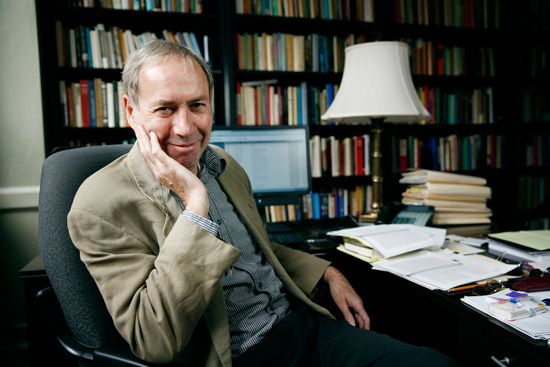
Communicating with the departed is something David Blackbourn does on a daily basis. As a scholar of German history and the Cornelius Vanderbilt Distinguished Chair in History, he sees his life’s work as a way to “get into the heads of dead people.”
“History is, in a way, communicating with the dead,” Blackbourn said. “I’m drawn to the strangeness of the past.”
Blackbourn, the son of a civil servant in Linconshire in the East Midlands of England, was the first in his immediate family to attend college. He had a love of history as a child, and went on to earn a Ph.D. at Cambridge in 1976. He taught at London University for 16 years before moving to the United States in 1992 to join the Harvard University faculty. He came to Vanderbilt this fall.
“The study of history is looking at the past through its own eyes,” said Blackbourn, who is the author of six books. “I’ve researched and written about supposed apparitions of the Virgin Mary in Bismarck’s Germany and what they can tell us, and I’ve also written about the environment and the German landscape and how it was transformed. I take pride in not sticking with the same thing.”
Blackbourn believes that if his students want to understand the Third Reich and the Holocaust, they need to know about more than just the events of the 20th century.
“For me, teaching history is about helping undergraduates to understand the human dimension,” he said. “Train travel, for example, changed the way people viewed time and space. The advent of bicycles, the telephone—these things changed the way people lived their daily lives. [rquote]There is value in knowing not just what happened, but what the human experience was really like.”[/rquote]
Blackbourn has received fellowships from the Guggenheim Foundation and the Alexander von Humboldt Foundation. He is a fellow of the American Academy of Arts and Sciences and the British Academy and is working on a book about Germany in the world since 1500.
This year he is teaching courses on Germany in the 20th century and religion and popular culture in 19th-century Europe, as well as a graduate seminar on problems and their sources in modern German history.
“I can’t imagine a more perfect life than reading, writing and teaching history. It is endlessly fascinating,” he said. “And when you are passionate about a subject, I believe that communicates itself to students.”
View the complete list of new university faculty for 2012-13.
View the complete list of new medical faculty for 2012.